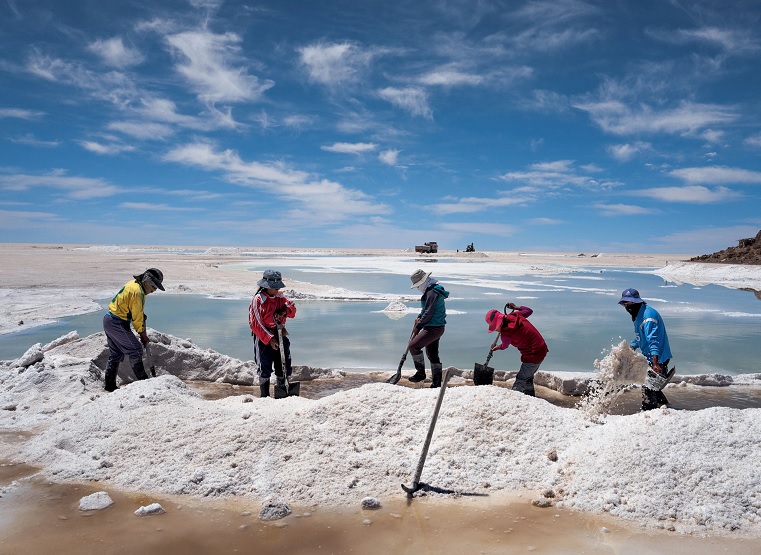RIO DE JANEIRO, BRAZIL – Bolivia is working to give a new direction to the industrialization of lithium with tests for the direct extraction of the mineral and thus increase its production quotas, given some analysts’ doubts about the national goals or that an eventual regional alliance to enter the global market will prosper.
The country has more than 21 million tons of lithium, one of the largest reserves in the world. The main one is in the Uyuni salt flat in the Andean region of Potosí, and to a lesser extent in the deposits of Pastos Grandes, also in Potosí, and Coipasa, shared between the Bolivian department of Oruro and Chile.
According to official figures, in 2021, US$24.5 million were invested in the reactivation of lithium exploitation projects; in addition, in that same year, the country received more than US$27.4 million from the sale of lithium carbonate and magnesium chloride.

PROJECTIONS
The Government of Luis Arce launched a research center in 2021 to develop technology to industrialize lithium and an international call for interested companies to test the technology of direct lithium extraction (EDL) in Bolivia.
According to the Executive, this technology will accelerate the process of lithium industrialization and announce the start of operations of a lithium carbonate plant that will reach a production of 15,000 tons per year.
Bolivia expects this center to increase the production capacity of the pilot plant of cathode materials for lithium batteries and those of cathodes, hydroxide, potassium chloride, and other raw materials that are already being produced in the country.
In addition, a quantification of the resources in the Coipasa salt flat is currently being carried out, with which the Government expects to increase the amount of Bolivian lithium reserves.
These projects aim to “have a new production quota” and “improve Bolivia’s position in the context of the lithium market”, said the Bolivian Minister of Hydrocarbons and Energy, Franklin Molina.
However, Pablo Solón, a researcher who held several diplomatic posts during the Morales administration, was less optimistic about the government’s goals and said that “progress (in industrialization) is very low in Bolivia”.
Solón gave as an example that the potassium chloride plant “has worked at 20% of its capacity since its creation in 2018 and that the lithium carbonate factory is almost four years behind schedule, in addition to which the income generated “is very low”.
LITHIUM BLOCK
Mexico, which has one of the largest lithium deposits in the world, as well as Argentina, with an important share of this resource, are pushing proposals to generate synergies in which Bolivia seeks to be a key player together with Chile and Peru. These countries together share progressive and leftist ideas.
Economist and lithium expert Pablo Poveda recalled that the idea of forming this type of block was raised in the early years of the government of then-President Evo Morales (2006-2019). Since then, there have been many changes.
Poveda pointed out that the reality of the lithium market “does not go by the aspirations that progressive policies have” and that “the raw material from the salt flats (Argentina, Chile, and Bolivia) can be displaced by rock material that is much more appropriate for production”.
Lithium extraction utilizing pools implies “high cost and time.” In the Bolivian case, it takes up to 11 months, while rock extraction, which is practiced in China and Australia, takes less than 24 hours through chemical processes, he assured.
He was also pessimistic about the possibility that the creation of a regional block could impact the international costs of the metal, “prices are controlled in the production of batteries, not in the production of raw material”.
Solon said that Bolivia “has to be much more realistic” in its pretensions.
“Any regional strategy can help” for the exchange of experiences, but unlike Chile and Argentina, which are in the process of extracting lithium, Bolivia and Mexico still “do not exist” in world statistics.
In the first quarter of this year, Bolivia generated around US$18.6 million from the commercialization of lithium carbonate and potassium chloride, which already surpassed the income obtained in the first half of last year, which was US$11.6 million.
With information from EFE

